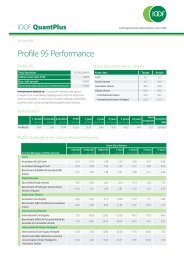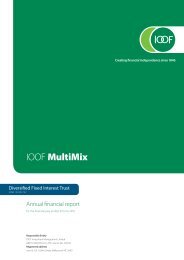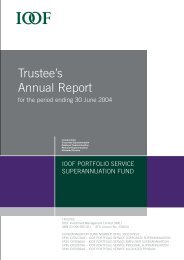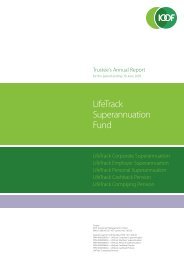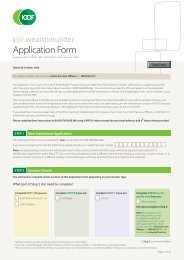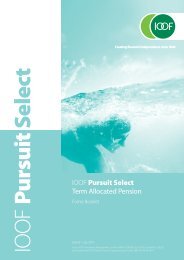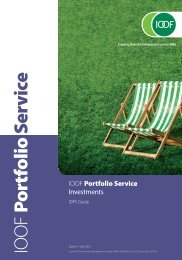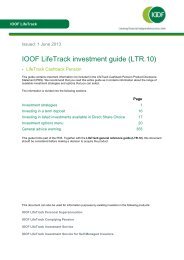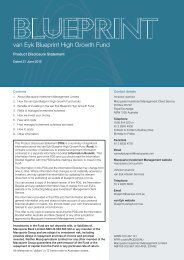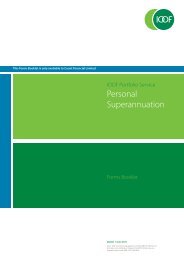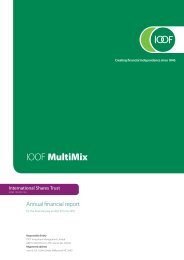annual report 2011
annual report 2011
annual report 2011
You also want an ePaper? Increase the reach of your titles
YUMPU automatically turns print PDFs into web optimized ePapers that Google loves.
IOOF | <strong>annual</strong> <strong>report</strong> <strong>2011</strong><br />
awards for which the related service and non-market vesting<br />
conditions are expected to be met, such that the amount<br />
ultimately recognised as an expense is based on the number<br />
of awards that meet the related service and non-market<br />
performance conditions at vesting date.<br />
For share-based payment awards with non-vesting conditions,<br />
the grant date fair value of the share-based payment is<br />
measured to reflect such conditions and there is no true-up for<br />
differences between expected and actual outcomes.<br />
The fair value at grant date is independently determined where<br />
considered appropriate. The option pricing model used takes<br />
into account the exercise price, the term of the option, the<br />
impact of dilution, the share price at grant date and expected<br />
price volatility of the underlying share, the expected dividend<br />
yield and the risk free interest rate for the term of the option.<br />
A small number of shares remain held by the IOOF Executive<br />
Performance Share Plan Trust (the “Trust”) as at the<br />
comparative <strong>report</strong>ing date. These shares will contribute to<br />
the employee allocation of shares on satisfaction of vesting<br />
performance hurdles. The Group has no right to recall placed<br />
shares. However, a subsidiary Company acts as the Trustee of<br />
the Trust, and can direct the voting rights of shares held and<br />
strategic direction.<br />
Shares in the Company held by the Trust are classified and<br />
disclosed as Treasury shares, and deducted from share capital.<br />
Dividends received by the Trust are recorded as dividend<br />
income in the financial statements of the Trust.<br />
Non-Executive Directors have the opportunity to participate<br />
in the IOOF Deferred Share Purchase Plan. The plan provides<br />
a facility for Non-Executive Directors to salary sacrifice base<br />
salary or future incentive entitlements in order to acquire<br />
shares. As the purchase is funded by Directors’ salary sacrifice,<br />
no additional expense is recorded by the Group.<br />
(j)<br />
Provisions<br />
A provision is recognised if, as a result of a past event, the<br />
Group has a present legal or constructive obligation that can<br />
be estimated reliably, and it is probable that an outflow of<br />
economic benefits will be required to settle the obligation.<br />
Provisions are determined by discounting the expected<br />
future cash flows at a pre-tax rate that reflects current market<br />
assessments of the time value of money.<br />
(i)<br />
Restructuring<br />
A provision for restructuring is recognised when the Group<br />
has approved a detailed and formal restructuring plan, and the<br />
restructuring either has commenced or has been announced<br />
publicly. Future operating losses are not provided for.<br />
(ii)<br />
Onerous contracts<br />
A provision for onerous contracts is recognised when the<br />
expected benefits to be derived by the Group from a contract<br />
are lower than the unavoidable cost of meeting its obligations<br />
under the contract. The provision is measured at the present<br />
value of the lower of the expected cost of terminating the<br />
contract and the expected net cost of continuing with<br />
the contract. Before a provision is established, the Group<br />
recognises any impairment loss on the assets associated with<br />
that contract.<br />
(k) Contract classification<br />
The accounting treatment of certain transactions varies<br />
depending on the nature of the contract underlying the<br />
transaction. The major contract classifications are insurance<br />
contracts and investment contracts.<br />
(i)<br />
Insurance contracts<br />
Insurance contracts are those containing significant insurance<br />
risk at the inception of the contract, or those where at the<br />
inception of the contract there is a scenario with commercial<br />
substance where the level of insurance risk may be significant.<br />
The significance of insurance risk is dependent on both the<br />
probability of an insured event and the magnitude of its<br />
potential effect.<br />
Once a contract has been classified as an insurance contract, it<br />
remains an insurance contract for the remainder of its lifetime,<br />
even if the insurance risk reduces significantly during the<br />
period.<br />
(ii)<br />
Investment contracts<br />
Contracts not considered insurance contracts are classified<br />
as investment contracts. The accounting treatment of<br />
investment contracts depends on whether the investment has<br />
a discretionary participation feature (‘DPF’). A DPF represents<br />
a contractual right to receive, as a supplement to guaranteed<br />
benefits, additional benefits that are:<br />
• likely to be a significant portion of the total benefits;<br />
• distributed at the discretion of the insurer; and<br />
• are based on the performance of a specified pool of assets.<br />
Deposits collected and benefits paid under investment<br />
contracts with DPF are accounted for through profit or loss.<br />
The gross change in the liability to these policyholders for<br />
the period, which includes any participating benefits vested<br />
in policyholders and any undistributed surplus attributed to<br />
policyholders, is also recognised in profit or loss.<br />
Deposits collected and withdrawals processed for investment<br />
contracts without DPF are accounted for directly through<br />
the statement of financial position as a movement in the<br />
page 61



